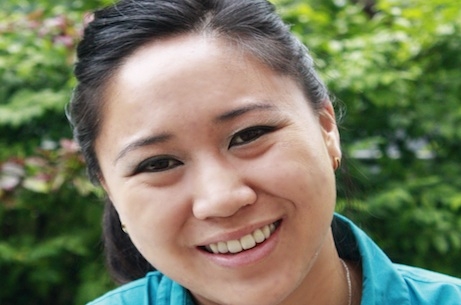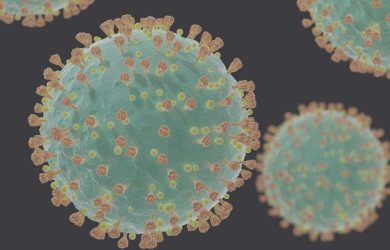
Lucinda Lai is working on healthcare issues for refugee populations.
Lucinda Lai [2012] spent the year before her MPhil working on mental health issues with Burmese refugees along the Thai/Burma border and is helping to write a book about these experiences.
Her organisation’s work involved training local Burmese counsellors and partner organisations in understanding mental health and spotting signs of mental health problems such as anxiety, depression and post traumatic stress disorder.
She had chosen to work in mental health because she felt that it was at the juncture of the humanitarian crisis and cultural issues that interested her. However, she found it a difficult area to work in. “I had friends who were doctors working on medical issues and they had a good sense of accomplishment and direction, but in mental health the problems are so large and undefined that there are no ‘solutions’ that are universally agreed upon,” says Lucinda. There is also a great sense of stigma among Burmese refugees about admitting to mental health problems.
Background
Lucinda’s decision to work with refugees and her MPhil in Sociology, focusing on health issues, have been shaped by her family background. Lucinda was born in San Jose, California, an area which has a large Vietnamese immigrant population. Many of her friends’ parents had come over as refugees following the Vietnam War. Her own parents were refugees from Cambodia.
Her father’s parents had scraped together money for the airfare to get him to Thailand when he turned 19 and became eligible to be drafted into the Cambodian armed forces. He left just before the capital fell and never saw his family again. All of them were killed. “That has shaped his life and is why he dedicates his life to his family,” says Lucinda. It was only, she says, when she was at college that she realised how much more her father did for his family than the average father did.
Her mother was sent to a Khmer Rouge labour camp, but contracted malaria after a month. She was then allowed to leave Cambodia to stay with extended relatives in Vietnam. However, she felt as if she was treated as an unwanted guest there and had few opportunities so she took the risk of going to a refugee camp in Thailand so she could apply for resettlement in the US. After a year she was resettled in California with two sisters and the rest of her family followed afterwards.
She met Lucinda’s father through the resettlement agency where he worked helping other refugees get jobs and getting access to government services. He often had to write letters to the government to arrange sponsorship for refugees. He often asked Lucinda to help proof read them.
Education
Lucinda says her parents placed a high value on education. “In the summer everyone else was playing outside, but I was studying maths books from the library,” she says.
She did well at school and was accepted to study Human Biology at Stanford, where she became president of the Cambodian American student organisation, offering a community of support for students who faced unique challenges as Cambodian Americans in college. “They tended to be first generation higher education students. Most had family histories of having been through war,” she says.
While she was at Stanford, Lucinda won a special sophomore research grant to do a project on organ donation in Thailand. The idea sprang out of her interest in how Buddhism and western medicine come into conflict around end of life issues. “There is a folk idea in Thailand that if you donate an organ you will be reborn with that organ missing,” says Lucinda. “I wanted to see how prevalent that idea was and how much of a barrier it was to people taking part in organ donation.”
She stayed for two months in Thailand, interviewing doctors and nurses around Bangkok about brain death and organ donation. She found instead that patients tended to see organ donation as a gift and something that brought them added merit in the next life. The problems around organ donation were much more to do with the way organ donation was organised and how medical students were trained about brain death. “Institutional issues were much more of a bottleneck than religious beliefs,” she says.
Refugees
Following this research, Lucinda was keen to apply for Stanford’s International Public Service Fellowship in her senior year, which allowed her to work for a year in a country of her choice on an issue of global importance.
She chose to work on mental health issues with Burmese refugees in Thailand.
“I had always wanted to work on refugee issues and I hoped that with this I could build my dream job which would quench my drive to work on those issues that were underlying everything I did,” she says.
Also wanting to go back to Thailand, Lucinda decided to work with the 150,000 Burmese refugees along the Thai/Burma border.
Her parents found it really difficult to accept her going to work in refugee camps on the Thai border. “They were really against it. They wanted me to go straight to medical school,” she says. “They were concerned for my safety and knew that a different set of rules operated in Thailand and that things could go out of control quickly. They came with me initially to make sure it was going to be okay.”
Upon the completion of the public service fellowship, she began an MPhil in Sociology at Cambridge because she wanted to study the issues in terms of how the underlying economics and politics impact health. She feels there should be no big distinction between mental health and physical health, and that health is a more holistic issue.
After she finishes her MPhil, she plans to go to medical school in the US. From there, she hopes to continue to work on healthcare issues in South East Asia, particularly with refugee populations.












